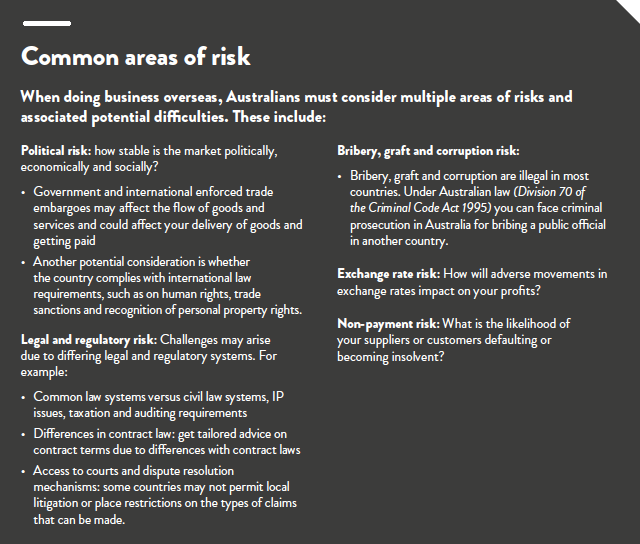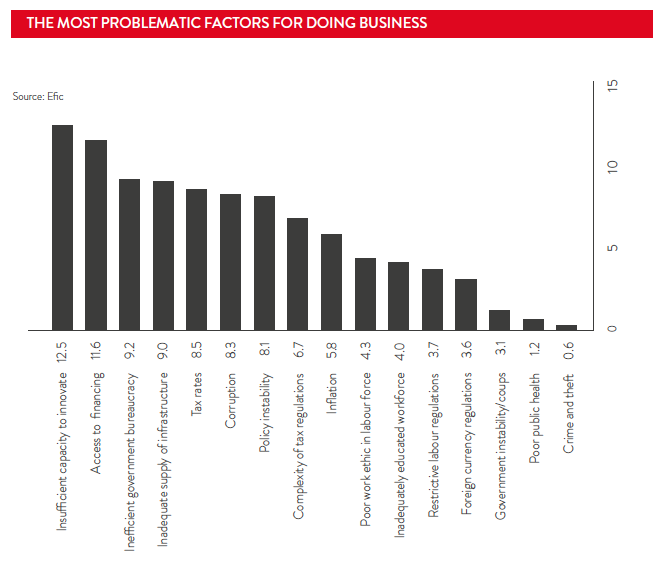Risks of doing business in China
China can be a challenging destination for Australian businesses, and in some respect can be more difficult than other Asian countries. Due diligence also has to be actively practised, with particular care taken to protect intellectual property (IP) when doing business in China.
Before entering the market, you need to understand China’s distinctive banking, taxation and legal systems. To mitigate such risks, Australian businesses should get professional advice where appropriate and thoroughly investigate the issues in entering the market and establishing business relationships. There are many people and organisations you can turn to for help. Choosing the right partners and the right professional advisers is a major step in mitigating risk. Your bankers, lawyers, insurers and accountants should also be able to give you knowledgeable advice about the risks you may face.
China is a complex business environment. Efic highlights China’s key risks as the evolving banking system and business regulations. This is in combination with a weak judicial system that makes it more difficult to enforce contracts.

Other challenges include rigidities in infrastructure and labour markets and a potentially volatile currency – all accentuated by the devolution of power to regional and local bodies.
While corruption is a significant concern, the Chinese Government is actively focusing on improving transparency and due diligence across government and business. Transparency International’s Corruption Perceptions Index 2016 ranked China 79th out of 176 countries on the perceived level of public sector corruption (1 being least corrupt and 176 most corrupt). China was ranked ahead of Indonesia (90) and Vietnam (113) but behind other Asian countries such as South Korea (52) and Malaysia (55). China’s sovereign risk is considered reasonably low, with a credit rating of AA-/Stable from Standard & Poor’s.
Difficulties with getting construction permits and initial set-up processes can be a particular concern for Australian businesses in China. The World Bank’s Doing Business Report ranks different countries according to how easy or difficult it is to open and run a small to medium-size business when complying with relevant regulations. In 2016, China was ranked 136th out of 189 countries (1 being the best) for starting a business, and a very low 176th for obtaining construction permits. However, China was ranked 84th for doing business overall, up six places from 2015 It rates quite well on enforcing contracts (7th) and registering property (43rd). And relative to other large, developing countries, it ranks well for trading across borders at 96th. India was ranked 133rd and Russia 170th.

Intellectual property (IP)
Intellectual property (IP) rights have been notoriously difficult to enforce in China. Despite recent improvements in the ability to both register and protect IP, some companies reportedly continue to suffer commercial losses due to problems in this area. Counterfeiting, for instance, is estimated to result in approximately 20 per cent revenue loss for many global products, while estimated losses from piracy and counterfeiting of movies and software can be as high as 90 per cent.
China is one of 13 countries on the US Trade Office’s 2015 Priority Watch List, which targets countries that do not provide an adequate level of intellectual property protection or enforcement, or market access for anyone relying on IP protection. Overall, however, protection of IP rights in China has improved in recent years thanks to the passage of new laws. Enforcement campaigns have also been stepped up, although this effort has not been sustained.
Regional tensions
Australians wanting to do business in China should also be aware of regional tensions involving China that may create sensitivities when doing business. China’s relationship with Japan is at times difficult due to historical grievances and an ongoing territorial dispute over the Diaoyu/Senkaku Islands. These can be sensitive issues for Chinese business partners and are best not to be discussed Protests also occur in some parts of the country where there are internal tensions including regional areas requesting independence. These can be disruptive for businesses.
Rival territorial claims in the South China Sea are another source of tension between China and some of its neighbours, including Vietnam and the Philippines. There is also ongoing sensitivity with Taiwan, which varies in intensity depending on the state of political discussions. Elections in Taiwan can particularly lead to increased tensions with the mainland.
Want to learn more? Explore our other China information categories or download the China Country Starter Pack.
